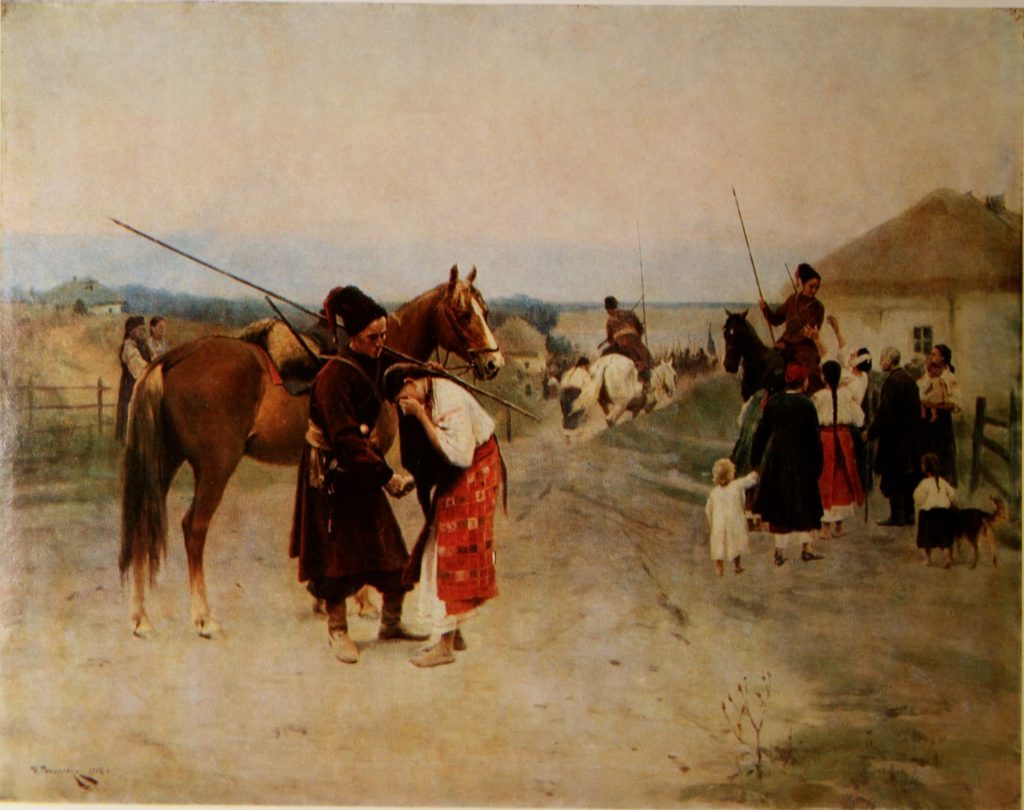The Failure of Multiculturalism in Polish Ukraine

Mykola Pymonenko – To War!
We are often told today that multiculturalism, that is to say a state made up of a diversity of peoples, is a great strength. No, it is in fact our greatest strength! To state any concerns or criticisms, no matter how mild, is seen as sacrilegious.
However, the opposite is true and throughout history where there are many examples of diverse and multicultural societies falling into discord and strife. The focus of this piece will be on a place that has been praised in hindsight for its liberalism and tolerance: the Commonwealth of Poland-Lithuania.
Poland-Lithuania came into being after the 1569 Treaty of Lublin when the Kingdom of Poland and the Grand Duchy of Lithuania were unified and made into one country. Prior to this, in the 1385 Union of Krewo, the two were linked in a personal union under the reigning Lithuanian monarch. Before 1569 what are now Belarus and the bulk of Ukraine[i] were also part of the Grand Duchy, which was the largest European country at the time. As per the 1569 treaty, however, Ukraine was handed over to Poland, thus setting the stage for a violent future of ethnic conflict.
The Polish nobility or szlachta was used to a high degree of autonomy which only became greater after the old Lithuanian Jagellonian dynasty died out. After this occurred, the monarchy was elected and became increasingly subservient to the nobles. The szlachta, it should be noted, was not entirely ethnically Polish. It would come to include Lithuanian, Ukrainian and other non-Polish noble houses that Polonized to such an extent that they may as well have been ethnically Polish. Examples of the power to which the nobility held include their ability to bring back serfdom (so-called neo-serfdom) and a 1518 law which stated that the king could not accept in his royal courts complaints of subjects on noble land, giving the nobility a free hand. Nobles eventually gave themselves power to introduce corvée labour, seize peasant land and the peasants working it.[ii]
Yet all was not well with the nobility during the years leading up to the tumultuous seventeenth and eighteenth centuries,
Perceptive foreigners… saw, for instance, that the much vaunted freedom of the szlachta, which gave Poland the reputation of being one of the freest states in the world, rested on the complete deprivation of rights and enslavement of all the other classes of the population, that along with the unlimited freedom of the nobles, the burgesses were deprived of all participation in political life, hampered in their economic development, and shut within the walls of the towns. Parliamentarianism was flourishing in Poland, but alongside it, the executive was powerless to function. … The royal power was rigidly limited, and all decisions were made by the powerful ruling classes of nobles. This class, moreover, was degenerating. The Polish nobles had lost their former chivalrous and fighting spirit. They were corrupted by wealth and had lost their former energy which could now be aroused only to fight for privileges against real or imaginary attacks by the royal power.[iii]
Not only were they corrupted by vice and power, but the szlachta had ceased to see themselves as having any relation to the people they ruled over. The nobility had developed, from the sixteenth century on, an ideology known as Sarmatianism, which erroneously said szlachta were the descendants of Sarmatians, a steppe people originating in what is now southern Russia. Importantly, szlachta saw themselves as ethnically distinct from even the Polish peasants.[iv] It also came to view Roman Catholicism as the only true form of Christianity. Such an ideology was bound to create sharp social divisions but especially with their Ukrainian subjects. This was to have a great and terrible impact on the Commonwealth in the mid-late seventeenth century. Read more






